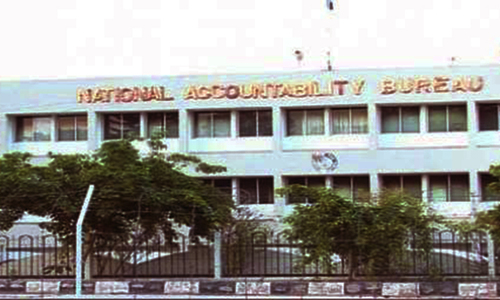ISLAMABAD: The Senate witnessed an interesting situation on the opening day of its monsoon session on Monday when the government managed to defeat a PPP-sponsored bill seeking to curtail powers of the National Accountability Bureau (NAB) in the final vote count.
The government managed to get the bill rejected with a difference of just one vote because of the division in opposition parties as lawmakers belonging to the Pakistan Tehreek-i-Insaf (PTI) and the Pakistan Muslim League-Q (PML-Q) voted against the bill introduced by veteran Pakistan Peoples Party (PPP) Senator from Sindh Taj Haider in November last year.
Another interesting aspect was that the bill was supported by three treasury senators belonging to the Pakhtunkhwa Mili Awami Party (PkMAP) and the National Party.
The rejected National Accountability (Amendment) Bill, 2015 had sought to amend various sections of the NAB Ordinance, 1999 with an aim to stop the bureau from investigating corruption cases in the provinces and to restrict its jurisdiction to the federal departments and ministries.
PTI, PML-Q join hands with govt to defeat PPP-sponsored bill seeking to curtail bureau’s powers
Senate Chairman Raza Rabbani had to put the bill to a vote twice after a 20-20 tie. When the bill was again put to a vote at the request of the treasury, it received 22 votes in favour and 23 against.
Earlier, while opposing the bill, Law Minister Zahid Hamid offered to form a parliamentary committee to revisit the controversial NAB Ordinance or refer the bill to an already constituted National Assembly committee headed by PPP’s Syed Naveed Qamar to review the bills related to NAB.
When the Senate chairman put the offer before Taj Haider, he declined it and requested that the bill be put to a vote.
It may be recalled that the bill had been passed by the Senate Standing Committee on Law and Justice in January in a similar fashion with a majority 5-4 vote.
Surprisingly, the Muttahida Qaumi Movement (MQM) supported the bill in the Senate, although its lone member in the committee had opposed it.
Arguing in favour of the bill, Taj Haider said the 18th Amendment passed in 2010 provided for greater autonomy of the federating units and anti-corruption was now a “residuary subject”. He said it was the responsibility of the provinces to constitute their own autonomous accountability commissions or bureaus as had been done by the Khyber Pakhtunkhwa government. He praised the PTI-led government for taking the lead in setting up its own accountability commission in KP through legislation.
The PPP senator said there were anti-corruption departments and various inspection teams functioning under the supervision of chief ministers in the provinces.
Former law minister Farooq Naek of the PPP said the NAB Ordinance had been introduced by military dictator Gen Pervez Musharraf in 1999 through an ordinance and the law had never been brought to parliament for review. He described the government’s opposition to the bill as “negation to the democracy and spirit of the 18th Amendment”.
Mr Naek said NAB should not be given the right to interfere in the provincial matters.
PkMAP’s Usman Kakar said NAB had been constituted by Gen Musharraf to prolong his rule and for arm-twisting of politicians. He called for abolishing NAB because it was being used by “agencies” against political parties as well as democracy.
Law Minister Zahid Hamid said the government also wanted to review NAB laws and reminded Mr Naek that when he was the law minister, the PPP and the PML-N had almost reached a consensus on setting up a new accountability commission, but the bill could not get through parliament due to differences over two or three clauses.
The minister offered to the opposition to sit with the government and review each and every clause of the NAB law.
The PPP and the PML-N — two arch-rivals of the past — have been accusing each other of violating the Charter of Democracy signed by the two parties in London in 2006 in which they had agreed to abolish NAB and form an independent National Accountability Commission.
The PPP did introduce a bill to replace NAB with Ehtesab Commission when it was in power, but the bill could not get through parliament due to differences between the two parties over a number of proposed clauses, including immunity to the president and the qualification for its chairman.
When contacted, PML-Q’s Mushahid Hussain said his party and the PTI had voted against the bill because the PPP had not consulted them before tabling the bill for passage. Moreover, he said, the PML-Q believed that there was a need to improve working of NAB, instead of curtailing its powers.
Published in Dawn, July 19th, 2016













































